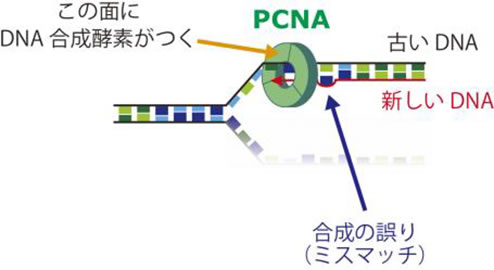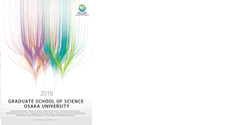Maintenance of ring-shaped proteins prevents mutations
A joint group of researchers led by Assistant Professor TAKAHASHI Tatsuro, Graduate Student KAWASOE Yoshitaka, Associate Professor NAKAGAWA Takuro, and Professor MASUKATA Hisao at the Graduate School of Science, Osaka University, and Professor TSURIMOTO Toshiki at the Graduate School of Science, Kyushu University, clarified a system for repairing errors in DNA synthesis and preventing mutations and cancer.
For cells to increase, it’s necessary to copy genetic information coded in DNA, but errors in the copying process occasionally occur. If these errors are left unrepaired, genetic changes, or mutations, occur. When mutations accumulate, the correct proteins are not produced, turning normal cells into cancer cells.
DNA mismatch repair is an important mechanism for correcting errors that happen during DNA replication. DNA is formed of two strands. In DNA replication, the parental strands separate, with each serving as a template so that new strands are made. The parental strands retain correct information, and errors are included in newly made strands. Mismatch repair differentiates the parental strand from the new one and repairs only the new strand with errors; however, the details of this response mechanism were not understood.
This group reconstructed in vitro mismatch repair by using eggs of African clawed frogs, experimentally proving that Proliferating Cell Nuclear Antigen (PCNA), which is necessary for DNA replication, had information for distinguishing the parental and daughter DNA strands. Furthermore, this group discovered that mismatch repair maintains strand information for an extended period by inhibiting unloading of PCNA from DNA.
While an accumulation of mutations causes cancer and genetic diseases, threatening people’s health, changes in genetic information are important in terms of normal immune response and as a driving force for evolution of living things. It is expected that this group’s achievement will be helpful in the clarification of the cause of mutation accumulation in humans, as well as in selective breeding by artificially accelerating evolution.

(Link) http://resou.osaka-u.ac.jp/en/research/2016/20160707_1









